Sacred Chickens
Menu
SACRED CHICKENS
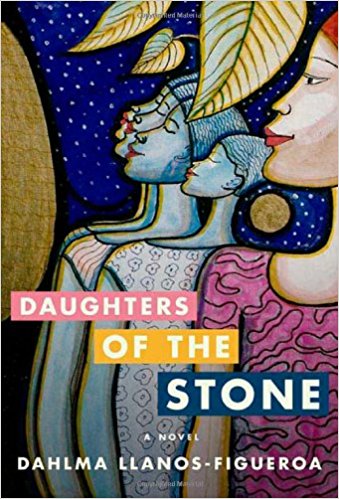 Daughters of the Stone by Dahlma Llanos-Figueroa Review by Julie Carpenter I will start with a disclaimer and a warning. The disclaimer is this: I know the author, I met her at a writer’s conference in New York this summer. (She is every bit as warm and compelling as the book she gave me.) Now for the warning: I pulled out the book at the airport and immediately became so engrossed that I nearly missed my plane. Be careful when you start this book. You won’t want to put it down. This story is the story not of one person, but of a family, a collection of narratives told and passed down by a family of Puerto Rican women, along with the magic stone of the title. This book begins in the mid to late 1800s with Fela, a woman stolen from her life in Africa and sold into slavery in Puerto Rico. She keeps with her a special stone, which she and her husband have imbued with the essence of a child not yet born. The stone allows the baby to be born, although Fela must make terrible choices to give life to her daughter. From the horrors and injustice of Fela’s story comes a family of powerful women. Fela’s strength threads its way through the lives of her daughter Mati, a powerful healer, and the succession of women who follow: Concha, Mati’s daughter who feels trapped by her family’s history; Elena, who must work hard to forge a life for her family in the United States; and Carisa, who completes the circle by returning to Puerto Rico. The characters are beautifully and tenderly written, each with her own sort of power, though flaws are not overlooked. In this family, not every daughter wants to follow the path her mother has laid out for her, but each generation is bound to the others by an intense love and the stories they have inherited. The book is fascinating on many levels, the beautifully drawn characters, the lyrical prose, the hints of the supernatural influence on the lives of women. It is also noteworthy for its portrayal of a time and place that has been overlooked by American history books, Puerto Rico during the days of slavery on the sugar plantations. This author does not flinch and the reader is forced to confront slavery from the point of view of those who experienced it. Llanos-Figueroa also does a remarkable job of delineating the bond between the women who don’t always agree with one another or accept the gift of the past graciously. The family bond gives strength whether it is deserved or always acknowledged. The past haunts the present, sometimes in miraculous ways. Your ancestors give you their stories and you must decide how to use them in your own. This book is highly recommended. But give yourself the gift of time when you read it. You might not be able to put it down. 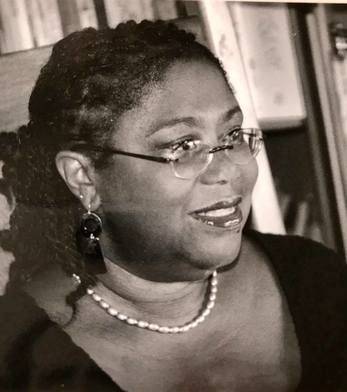 Dahlma Llanos-Figueroa was born in Puerto Rico and raised in New York City. She taught in the New York City school system before becoming a young-adult librarian. Dahlma has won the Bronx Council on the Arts ACE and Brio awards, as well as a Literary Arts Fellowship. This is her first novel. She lives in the Bronx.
0 Comments
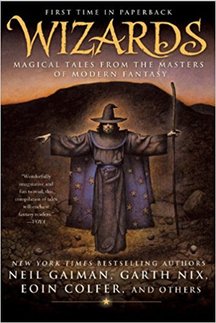 Wizards, witches, warlocks, enchanters, have all captivated humanity since the beginning of time, whether they be the mysterious shamans from the time of early man or the fascinating and powerful characters in blockbuster films. In these new stories by some very well-known and prolific authors in the fantasy genre, every point on the spectrum of mages is explored, from Harry Potter-esque stories about children discovering their hidden talents to epic battles between warring wizards. I enjoyed almost every story. The ones I didn’t like I felt were either not relevant to the overall tone of the collection or were ideas and themes meant to be expounded upon in a full-fledged novel. Usually, I generally avoid short story collections because I find that many of the stories presented would have made better novels, but this was very well done. But, there are some stories in this collection that I felt deviated from the title. Some were not even about sorcerers, but made a vague reference to them in the story. Not that the stories were not good, I just don’t think that they belong in this collection. However, there were a few in here that were, frankly, bad. Poorly written, childish and simple plots that were not enjoyable. But they were precious few, and for a short story collection, I think that speaks to the overall talent of the authors presented. For me, the most outstanding piece in the whole collection was the very last, called Stonefather. It detailed the journey of a boy named Runnel, who runs away from a family that he feels will not miss him and geos to the neighboring city to seek a better life, a city ruled by Watermages, who fear the powerful Stonemage that Runnel is employed by and others like him. Throughout, we see Runnel discover his hidden talents and help to bring harmony to the city he lives in. I would love to gush about every detail of this story, I sadly must move on. Although it was my favorite, the progression of events throughout was a little fast paced. I would love to see this turned into a novel. You could theoretically spend several chapters talking about Runnel’s home life. Some of these stories were not great, for various reasons. This was sadly the case with Holly and Iron, by Garth Nix. I really hate to say that about Nix, because I loved the Abhorsen series he wrote, is one of the best fantasy series that I have come across. But this would have been better as a novel. There was not enough substance, and the epic plot he presented did not fit on thirty-five pages. It needed a whole book to be effectively told. It details, somewhat like Stonefather, the battle of two warring factions of sorcerers, who have different abilities. Its main character is the princess of the losing side, who is destined to unite her people. What I really like is that the story bears a strong resemblance to the tale of King Arthur pulling the sword from the stone. There was another outstanding story in this collection, The Strangers Hands, by Tad Williams. In my opinion, it leaned more towards fable than story. It details the account of small town that receives a new visitor who performs miracles by touch, somewhat reminiscent of The Green Mile, but that was as far as the similarities went. A wizard comes into town to counsel the local priest about the matter, and discovers that the stranger is one of the darkest wizards of their time, a Voldemort-like figure. He is mortal enemies to a powerful sorcerer, who is summoned to deal with the matter. The plot seems predictable, but it does not go where you expect it to. In one of the stories that caught my attention, the author wrote a strong friendship between a Christian priest and powerful Wizard. The relationship in the story is a normal one. I thought nothing of it, at first. But in a time of great division, it’s important to talk about unity. I may be wrong, but by writing these two characters as friends, I think the author may have had another message to the story. Many faiths around the world demonize or fear a religion that is not theirs. They deem them heretics, and sinners. This has been seen in many wars and conflicts throughout history, but it’s also true in day to day interactions for many people. I’m a great believer in the phrase, “people often fear what they don’t understand.” That applies to everything, whether it be a person’s religion, nationality, or the color of their skin. But by making these two interact like they do, may be a subtle message of acceptance and tolerance, which is something that we could all use more of, even when our representatives don’t reflect that. Finally, there was a story that really got on my nerves, The Fowl’s Tale, by Eoin Colfer. It was the story of a bird that claims he is the lost prince of a prominent kingdom. I just really felt that this did not belong here. The only mention of sorcery was that a magic ring supposedly turned the prince into a bird, but even this to me was reaching a bit too far to be classified as a tale of wizardry. I don’t know if this was a matter of lazy editing, or a thoughtless attempt at adding diversity to the collection, but it did not work. In summary, I was pleasantly surprised by this book. Overall, I found most of the stories to be thoughtful and engaging. Some, of course, were a miss but I think that’s sort of normal for a collection of stories. Very rarely will you find one where you love every single installment. I hope to read more collections in the future. 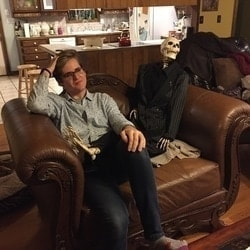 Jarad attends Middle Tennessee State University, loves tea, and tries to spend every spare second reading. Jarad is majoring in English. Bless his heart! Let's all light a candle for him and send him happy thoughts!  By Jarad Johnson He stared at it. That awful presence had been tormenting him for months, watching his every move, watching him. Its eyes bored into every part of his body, stripping away his defenses and leaving him exposed. It knew the deepest, darkest parts of him; it knew everything. At first, when he still doubted what he knew incontrovertibly but would not admit, he had tried to ignore that feeling. When he slept at night, he would awaken to feel its eyes on him, always. It never left, never slept, never did anything but watched him. That was its only occupation. He stayed up sometimes, when he was not comfortable enough to sleep, contemplating what it was, what it wanted. To this day he still had no idea. It may have been some malevolent force sent to torture him before his descent into Hell, or an invention of the government to keep watch on his every move. Whatever it was, he wanted to be rid of it before it drove him mad. He was already well on his way to becoming mentally ill. He hardly ever slept or ate, and when he did venture outside, he was cautious and was always looking over his shoulder. He had to get out, had to leave. Or he would go crazy. He had moved out of his posh apartment and had gone, “off the grid,” as his daughter would say. He had left in the middle of the night, leaving his wife sleeping in their bed. Of course, she would never understand what was happening. She had even naively told him that it might be a good idea to check himself into a facility, to cope with his, “odd behavior”. It was all too peculiar to believe without experiencing it first, he supposed. He now resided in a little one-bedroom loft above a foul-smelling Italian restaurant; however, the upside to his broom closet was the fact that it had only one window. Normally, he would have detested the idea of inhabiting a space that so closely resembled a prison cell. But for some time now, he had awakened to the sounds of gunshots or dogs barking instead of that despicable feeling of observation, which was sadly an improvement. He carried on with some semblance of his older life. He worked the crosswords every morning with a cup of coffee, and then went for a run. Most of the time, he would come straight home, but sometimes he stopped to get groceries or for a latte, if he felt like treating himself. In short, some semblance of his normal life and routine returned. He began to feel secure in the knowledge that he was no longer being watched, that he was finally free of it. But of-course he was wrong, wasn’t he? Even as he slept fitfully on that hard, lumpy mattress for what felt like the first time in months, some part of him knew he wasn’t free. He could never truly escape those eyes. It started with coffee, as do most things. He had just come back from a run, craving caffeine. He hadn’t slept the night before, and if he wanted to continue to live in his crusty little apartment, he couldn’t sleep through the day. The only way he had been able to make any money in his exile was to fix the odds and ends around the building in exchange for lowered rent each month. He was just staring into his coffee, contemplating his semblance of a life, but he couldn’t suppress an involuntary gasp when he saw those damned eyes again, a gasp that caught the attention of everyone. As he was staring at the apparition, he heard a voice behind him say, “Sir, are you all right?” He turned around to see a clerk looking at him like he was some sort of loon, along with all the customers. He tried to act normal, and looked back down to his coffee, but it was still there, watching, always watching. He panicked, and threw the mug blindly, shattering a front window. Panting, he ran down the street. It was then that these episodes occurred with more frequency. At the grocery store, he saw it in the mirror, dropping the gallon he was going to buy. At the gas station, he opened a cherry coke, and it stared at him through the liquid, reminiscent of the coffee shop incident. In his building’s shitty excuse for a courtyard, trying to decide whether or not to tell Tyler, the manager, that the expensive coy fish he bought were all dead and rotting in the pond. And most notably, he saw it when he was in the park, behind a tree trying to avoid old cigarette butts and beer bottles, when he was taking a picture of the old stone fountain in the park in the perfect light. Then, he saw the face in focus right through the lens, staring back at him with that maniacal smile. He had never gotten a good look at it until then, usually because it flitted away just at the edge of his vision. But now he saw it straight on, and it was not what he expected. As he stared closer and closer, he felt a scream building up at the back of his throat, and his entire body went numb with shock. He couldn’t see any definitive features that would mark it as male or female, but it was definitely beautiful. Or rather, it would have been if not for the unnaturally large smile that covered nearly half of its face. Also, its perfect features were rotting and filled with maggots. As soon as he noticed them, they crawled out from between its overly large teeth and started wriggling towards his eyes. He screamed then, as he had never screamed before. It reverberated around him through the trees. He dropped the camera, leaving on the ground, shattered. After that, he couldn’t leave his apartment. He locked the doors and covered the window. He awoke one night a couple of weeks later to a ringing cell phone. He had told no one where he was going, and consequently had disposed of his iPhone and gotten a prepaid, untraceable flip phone. Who would be calling him? He had spoken to no one, made no friends since he had gone into hiding. He had made himself unnoticeable and unmemorable, so as not to attract attention. He looked like every other person getting off that subway, didn’t he? With shaking hands, he answered the call. “Hello?” he said in a breathy whisper. He waited almost a full minute, with the phone pressed against his ear, heart thumping against his chest. He worked himself into more of a panic with each passing second, thinking that it was a wrong number or a prank call. Then, he heard an intake of breath, and his blood ran cold. “I see you, Thomas.” The voice had an almost reptilian quality, with all of the s’s being accentuated and lengthened. He could feel sweat trickling down the small of his back as he tried to formulate a response. Finally, he said, “Who are you? What do you want?” He thought he might be having a panic attack, but that seemed unimportant at the moment. What it said next was all he was focusing on. “You will never escape me, Thomas. I will never leave you, so long as we both shall live. Till death do us part.” The call was ended with its whispery laughter. At this, he really did have a panic attack. He hyperventilated and saw dark spots on the edges of his vision. The panic and terror he felt were crushing; he could not breathe. He tried to rise from the bed, and passed out in a heap on dingy carpet, taking part of the blanket with him. The next morning, he felt like he had a hangover. He got up, fixed his coffee, and as he sat down, he felt better. He could always move again, right? Maybe out of the country, in a remote part of France. Yes, that would be nice. There was a morning paper on his table; it must have been there for days. He picked up the paper and started reading. It detailed the story of one man who had exposed the intelligence agencies in the US for overreaching in their surveillance. That didn’t make him feel any better. As he continued reading, he came to the Politics section. That always made him feel ill, so he tossed the post in the trash. When he was done, he gathered up his things and headed for the door. It was then that he noticed. He saw it first in the mirror by the door, then in the glass fishbowl where he kept his tiny angel fish. As he spun in faster and faster circles around his apartment, he realized, with a growing horror, that IT was everywhere. It had the ability to duplicate itself and change into multiple variations of the original. No longer was it contained within a cheap wooden frame with those gaudy curtains. No, now it was everywhere, everywhere he looked, and on every surface, watching him, taunting him. He shrieked and ran into his bedroom, blindly looking for an escape from this awful demon, this evil incarnate. Once inside, he took every effort to barricade himself. He stacked the desk, his dresser, and the one comfortable but substantial chair he had against the front door. Faintly, he heard music playing in the background; a sort of tinkling, like a music box wound too slowly. He rustled through desk drawer for his letter opener. The music got louder and louder until he was nearly doubled over from the sheer volume. The only thing louder than the music was the cackling of it, that thing. The letter opener was all dull and rusted. It was barely serviceable as a letter opener, much less a weapon. He sat on the bed, clutching the knife and waiting. He waited for some time before he heard it. An awful banging at the front door, like a battering ram was trying to make its way through. He could hear the door buckle with every blow, and of course it was only a matter of time before it gave way. Thomas backed slowly away from the bedroom door, and as he crept backwards, the crashes got louder. He stood with his back to the window, and by this time, he could hear the door splintering. But instead of light peeking under the door, he saw only darkness, terrifying darkness. Crash! That disgustingly familiar voice. “You see, Thomas, there is no escape. I am always near, wherever you go, wherever you run.” He was suddenly very angry. He dropped his knife and turned to face the window. Instead of letting light in, it was the opposite and completely dark, like the door. He wanted that thing gone. It had ruined his life and his sanity. But it was too strong. Already, he felt it dragging at his arms, pulling him toward it, telling him to stop and lay on the ground. Desperately, he flung himself at his assailant, going through its cavernous maw, and for a brief instant, he felt the measure of his success. He had done it. He was free! Later, the police officers, who had received a call from the manager of the complex, came out of his apartment to examine the body of the man and call it in as a suicide. He had obviously been mentally ill, but they could find no history of mental instability. But it was when the victim’s picture aired on the local news that everything really fit into place. His wife and children came forward, describing how it had been more than a year since they had seen or heard from him, and, they said, six months before his disappearance he had been acting strangely. He had boarded up all the windows in their house, and kept them in a perpetual state of gloom. How he kept talking about these eyes he was seeing. A barista and a grocery store clerk had come forward telling the same version of that story more or less. A suspicious looking man had been mumbling about a pair of eyes he saw, with a tormented air about him. However, after the examiner manged to pry the poor man’s body from the pavement, he noticed something unnerving. Thomas was smiling, as if he had been experiencing euphoria moments before his death. They went through the usual procedures of notifying the family. Presiding over it all was that ridiculous window that had been tormenting him, broken with half a curtain flying out of it, as in defeat. And if you looked closely enough, it appeared that a shadow was fading from the glass, looking for another place to inhabit with its malicious intent 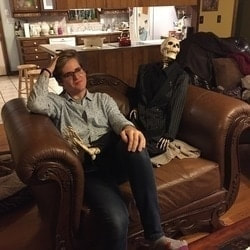 Jarad attends Middle Tennessee State University, loves tea, and tries to spend every spare second reading. Jarad is majoring in English. Bless his heart! Let's all light a candle for him and send him happy thoughts!  100 Days of Mindfulness by Tracey Moore Lukkarila review by Julie Carpenter This book is subtitled: a daily journal to soothe anxiety, stress, and emotional distress through mindful living. It is a one-hundred-day exercise in learning to overcome negative thinking and to be present in your own body, in the moment you are given. There is no denying the difficulty of remaining present in our Western culture. Society values thoughts about the future, orienting on success and tasks to be achieved. Until very recently therapeutic thought focused almost solely on past issues; patients were advised that their current difficulties could all be traced to the past. There’s very little emphasis on fully living in the now. As such, many people struggle with intrusive thoughts and racing minds. This journey into mindfulness is meant as a daily guide to living in the present. The author of this book, my friend, Tracey Moore Lukkarila, used journaling to help her deal with her clinical depression. The exercises contained in this journal are things she personally used to help refocus her mind and find peace in the present. Each day lists activities for the reader. As each exercise is introduced, both the purpose and practice are succinctly and simply explained. The author also adds encouragement (and reminders that there are no right answers) throughout. There are exercises to help reframe negative thoughts and to express gratitude. There are also exercises that refocus the mind on the body, like listening to shower sounds or journaling about nature in detail. There is space for writing down answers, but it might be wise to invest in a small notebook, not only for extra space but also because you may find yourself repeating many of the exercises after 100 days or you may find that you have some favorite exercises that you want to journal about again, as I did. The book is well laid out with plenty of white space. The hints and explanations are spare and simple. Even the visuals of the book are designed to be calming instead of busy. Although the book is meant as an everyday journal for 100 straight days, I find that I can use it when I am stressed and then put it up for a few days or sometimes weeks at a time and return to it. Many of the assignments stick with you even when you are not journaling, like focusing on your sense of smell or the fact that you have clean water. Most exercises are simple enough to remember even if you don’t have the book handy. I have not been diagnosed with depression or anxiety disorder, but like many people, I am stressed and busy, sometimes to the point where I find it difficult to function. This book is an excellent tool for developing a more mindful day to day presence in the world. I highly recommend it.  Tracey Moore Lukkarila has worked in the health insurance industry for nearly two decades, holds a BBA and certificate in Public Health, and is a registered yoga teacher. She aims to bring her professional and personal experiences together to advocate for mental health and to help others who struggle. She lives with her husband Troy and their 6 cats and dog in Florida. Visit her blog traceylukkarila.com. More Than Commitment We see the bend and the gulls in full motion outside our door. We feel the moon in our mouths and foolish dreams drip down our inner thighs. It’s time to relinquish our boat on the ferry docks, relinquish our dearest pet at the graveyard. It’s time to know the yellow lands of late summer - let the air into our home and let the lock on this sanctuary be broken - to open more than possibilities, more than a Sunday-hope. We see the bend and we say goodbye, out of the funnel and into the luminous sky. Secret We share an altered epiphany each night we merge below water, never speaking but touching satin against soul, tumbling in our home-spun ecstasy like the pounding of pure birth. We rise and fall speechless, buried in the radiance of our realm where we journey, our skins seeped in sensuality, still discovering after nineteen years, building a depth unencountered - the two of us, bending, refitting the mantra of male and female confinement, drugged by the surprise, by the thickened lips of our controlled urgency, blind to all but each other, the muse of our naked dancing, breathing, visceral releasing, and at the end, laughing as though we were seeing our first ever snow fall. Son of no one There never was a moment for you when freedom could have ripped your destiny in two - where choice not chance could have uncornered your existence. Because you took every risk - collapsing in the shadows, coveting the Egyptian Buddha. Your breath is like a child’s, breaking on a slab of rock held close to your face. I would fan the sun for you if it would make a difference, if your shoes would stay tied and your rage would stay at bay. I would pluck the curse from your veins, if there was something to pluck, if it wasn’t acceptance and only acceptance that would change the curse, not remove it, but alter its outcome. I love your eyes, beneath your dark ridge brows. I hear you singing in the middle of the night. I can taste the salt on your lips. You want to be cold, but you can’t be. You were made this way, to enter the world at your own pace. You are elemental, wider than your history. You are not alone. And that is something. Kneel Beside Love If ever you kneel beside love strip yourself in the midnight cold and your heart expands moist like ice on heat feels the flood the zealous delight uprooting misery in moments too marvelous for words . . . Gardeners, lovers you decide the wish beside each other faces are made real inadequacies vanish leaving no trace of murder or time What you feel walking in this pulsing spring daring such joy no illness could alter What you feel briefly as you join skin and souls . . . creating refuge even death cannot violate. Wingbeats I could tell you never close your eyes it is us and us only who carry the iron and dismiss ourselves from the cross Where is home? Can you answer me in this month of sensuous summer? When we love is it enough to entice the dead from their settled sleep? I once heard the sound of pain in an old man’s voice It was real the magic of song milk from a mother’s swollen breast the authentic desire for union Every vineyard has its legend Every someone wanders protected and important in this long age of insanity Nearly all dancers have hesitated, felt their passions, suspicious unnatural impulses depleting their strength But so – heaven is not a womb nor a winter’s twilight intense but brief I once saw a golden eagle repeat its wingbeats alone in the breeze flapping as if to say: I know myself completely. Truth Givers They are in the hospitals They are under the eucalyptus trees They are in the anniversary cakes They are in the stone-hedged mansions gossiping on the latest idea to muse over with their delicate, pale hands. At the end of heaven’s domain they celebrate entrance into the market place where they arrive with their wings, proud and evasive. Too large to drown in the gloomy crowded faces, so they soar between the sheep herd trapped in that superior altitude. The wind fingers them with its wet tongue. Unharmed, they rock over the body of the weeping sky, searching for something beyond conclusions or ecstasy. The artists tilt, shipwrecked next to them: Locked on horizons of unresolved beauty. Some days their eyes close and the flute touches the pen with explosive unity, with ancient embrace. As far apart as the ghost and the angel, they edge inside the artist’s heart, just to feel the skinless souls of love makers.  Allison Grayhurst is a member of the League of Canadian Poets. Three times nominated for Sundress Publications “Best of the Net” 2015, she has over 1100 poems published in over 430 international journals. She has sixteen published books of poetry, seven collections and nine chapbooks. She lives in Toronto with her family. She is a vegan. She also sculpts, working with clay; www.allisongrayhurst.com 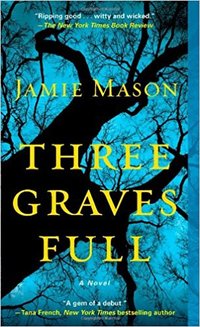 I have heard some people say from time to time that the opening line of a novel will either make or break it, so to speak. While I have found that this is not always the case, it certainly was for Three Graves Full. The opening line consisted of, “There is very little peace for a man with a body buried in his backyard,” which nicely sets up the novel for the reader. Not only is darkly humorous, but it lets you know the tone of the prose. It sums up the s novel’s best traits, a healthy dose of gallows humor mixed with an interesting plot, overlaid with a tense and rapid-paced writing style that kept me reading. In short, I greatly enjoyed it. While I always enjoy well-written gallows humor, it is worth noting that the plot of the novel was as equally well written. It starts off with Jason Getty, a seemingly mild-mannered man who has murdered his supposed friend and buried him in the backyard. Since he can’t bring himself to tend the yard himself, he enlists a local landscaping company to do it for him. But surprisingly, they find two other bodies planted in the front garden. What follows is Jason’s attempts to keep himself out of prison, and all of the twists and turns that entail. This is a plot that I could probably write about for the next five pages, but in the interest of not spoiling it, I reluctantly won’t. What really surprised me about the book was its lack of predictability. One reason that I don’t read many crime novels is that, after a while they all start to have the same plot. Of course, there are some wonderful exceptions, such as this one, but in general I find that they can be few and far between. But this is so full of twists and turns that it leaves the reader constantly guessing. Furthermore, I have often found examples in the crime genre consist of “lazy writing,” where the prose is so watered down and juvenile that it completely takes you out of the story. This is not the case here. The author writes with authority and intelligence that I found to be refreshing. It was very well done. Also, I think it’s worth noting that the book is never cut and dry. There are few definitive good or bad guys, but differing shades of gray. This, to me, mimics real life more closely. I appreciate that, because it annoys me when books presume that morality and the kind of complex issues that the book deals with are simple. However, as I was reading I did notice a few minor issues that I would like to touch on. Throughout the book, there are many plots and subplots that are explored in great detail. However, while I recognize that they are all essential to the storyline, it think that they could have been lengthened a little to avoid the feeling of over-crowdedness. There is a lot going on here, and while I didn’t mind it, I think that if some of the storylines were explored in greater depth, it would have been slightly more cohesive. Likewise, I would have liked to have seen more into the mind of the main character. There are many points throughout where I think it would have been beneficial for the author to have given us more of Jason’s perspective, of his unravelling. I think it would have been interesting to see him devolve a little more. Overall, I can say that I was pleasantly surprised by this novel. Its plots twists constantly had me guessing and engaged. I appreciate the fact that the author chose to more accurately represent real life, in all of its messiness. It was very believable. I look forward to reading more from this author, not only because she’s very good but because this novel challenged my assumptions about the genre. 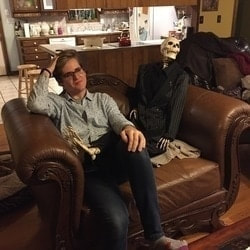 Jarad attends Middle Tennessee State University, loves tea, and tries to spend every spare second reading. Jarad is majoring in English. Bless his heart! Let's all light a candle for him and send him happy thoughts! 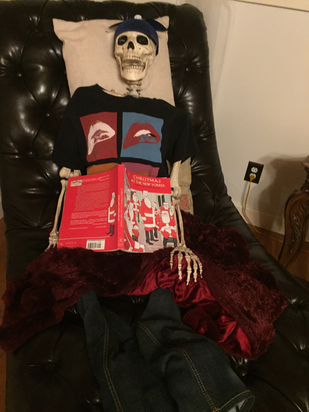 The Final Day of Peak Week at Sacred Chickens! Roy, who's over here enough to be an honorary chicken, writes a story set in Whistlestop! (By the way, Uncle Morty agreed to the use of his photo but wants to make it clear that he is not the protagonist of this story.) Rennie turned the big oven up a couple of notches, opened the door, and pulled the toe tag off the corpse so he could file it for today’s work list. This was the third corpse being cremated today and he still had to clean out the oven afterwards before going home. It had been a busy week for the funeral business in Whistlestop, what with the annual Pruning of the Vicars Festival and all of those accidents at the corner of Poe and Bierce—seriously, when were they going to get around to replacing those missing stop signs? Rennie filed the tag with the others then turned back to the cart with the corpse on it only to find that the cart was bare. Alarmed—and who wouldn’t be?—he took a step back and glanced around the room. There he spied it, hunkered down between the wall and one of the prep tables, naked with a y-incision on his chest, wide eyed and looking a bit scared. “Hey, buddy. You okay?” He said to the still shaking corpse. The corpse turned his head away, trying to ignore the sudden attention. “Hey! I’m talking to you!” Rennie shouted. “You gotta get back on the cart so I can roll you into the oven.” That got the corpse’s attention. “No way, man!” it said in a voice dry and creaky. “I don’t like fire!” “Yeah, well I gotta job to do, the flames are hot, it costs money to run this thing. Let’s get hopping.” “I don’t like fire!” The corpse backed even closer against the wall. “Well, your family opted for cremation, so that’s what we’re doing.” “I changed my mind. Bury me instead.” “Too late. Papers are signed, the oven is hot, let’s go!” Now Rennie was getting agitated. He had dinner plans and this guy was messing that up. “Yeah well, I don’t wanna be buried anyway,” said the reluctant corpse. “I’m claustrophobic. I wouldn’t be able to breathe. I’d have constant panic attacks for all eternity. I don’t like the dark.” The corpse chattered away, biting at its nails. “Then oven it is. Let’s GO!” Rennie was out of patience. Talking corpses did that to him. “Can I have a smoke first?” “You can smoke in the oven for all I care,” said Rennie, eyeing the clock. Six was approaching way too fast. “So go ahead, hop right in.” Can I bum a ciggie? Someone stole all my clothes.” “I don’t smoke.” “Fine time to quit! Right when I need one.” The corpse went back to biting its nails, chattering nervously. Rennie was now out of patience but unsure of what to do. He didn’t relish the idea of wrestling a naked dead man into the oven this late in the day and really wanted to make that dinner date. Spaghetti on toast at Stan’s Whispering Pancake House with the charming, if chatty, Amelie. Dammit, now he was getting hungry. Something had to be done. “Ya know, as fate may have it, I think I left a pack of smokes in the oven. Here, hop on the cart, I’ll roll you right in.” “Oh no! I already died doing something stupid, you can’t fool me twice!” The corpse folded his arms in front of his scrawny chest and stuck out his jaw defiantly. Well it was worth a try, thought Rennie. “So how did you die anyway?” “I took a drink from a can of Faygo without wiping off the top first and died from an infection.” “What?! That’s just stupid. You can’t die from that. Nobody dies from that!” “Well, I did. The doctor said so.” “They still make Faygo?” “They do. I drink it all the time.” “How did the doctor know the infection was from a dirty can?” “He’s a doctor. They know things.” Rennie was tired from arguing with the corpse. The circular logic of the dead was giving him a headache. “Look—if I go find you a cigarette will you get in the oven so I can get outta here?” “Yessssssssss… “ the corpse hissed, rubbing its hands together in anticipation. “Be back in a minute.” The corpse’s eyes watched him as he walked across the room and out the door. Maybe Huck, the receptionist, had a cigarette he could have. But Huck was on the phone with a customer so he waited until he was done to ask. “No ma’am, you can’t bury your husband until after he’s been officially declared dead, even if you do pay for the plot ahead of time. Just because he lays on the couch all weekend long doesn’t mean he’s dead.” Huck was rolling his eyes at Rennie while he talked. It must have been Mrs. Tilsby on the other end of the line, she called a few times each month with these sorts of questions. “Yes, I don’t care what incentive you come up with.” He narrowed his eyes a bit, listening as she spoke on the other end. “Well, that might work if I close my eyes, but it’s not my decision, so no. Bye bye, Mrs. Tilsby, I’ll talk to you next week.” Huck hung up the phone and shook himself all over. “Blah! That lady drives me nuts!” He looked at Rennie suspiciously. “What do you want?” “You got a cigarette?” “Um… “ he patted at his shirt pockets. “Yeah, somewhere. Ah! Here they are, right in front of me.” And they were. On the desk right in front of him. He stuck one in his mouth and pulled a second one out and handed it to Rennie. “Thanks,” he said, taking it. “Hey, when did you start smoking?” “It’s not for me,” said Rennie as he walked down the hall towards the crematorium. He half thought that the corpse might be gone by the time he got back but there he was, still sitting on the floor. “Here ya go. One ciggie.” “The corpse’s eyes lit up and he reached hungrily for the cigarette. "Gimme gimme gimme!” The corpse snatched the cigarette from Rennie’s hand and put it in its mouth. “A light! I need a light!” the corpse hollered. Rennie calmly walked over to the oven door and opened it up. “Here ya go,” he said, indicating with one hand towards the flames inside. “Yesssssssss!” hissed the corpse as he pulled himself off the floor and ran to the oven, throwing himself inside, heedless of the flames. Rennie slammed the door shut and peeked through the little window just in time to see the corpse light the cigarette and take a long, noisy draw on it. Immediately he started coughing, choking on the taste of it. “Hey! What the? This is menthol you cheap bast—” but Rennie never heard another word the corpse said because he had turned up the flames to full blast. “Spaghetti on toast, here I come.” Roy Peak 08-2017 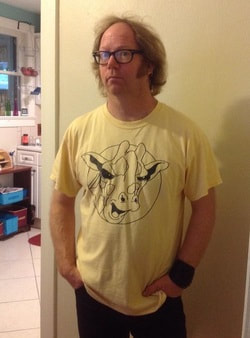 Roy Peak has played electric bass in more bands than he cares to remember for more years than he can remember. He wrote the theme song for the Utica, New York radio show "Hey You Kids, Get Off My Lawn" on WPNR-FM. His solo debut album, All Is Well, has been called "Loud, cacophonous, and beautiful by a truly unique artist." His short fiction has been published in The Dead Mule School of Southern Literature and he writes music reviews for the King Tut Vintage Album Museum of Jacksonville. Roy writes music reviews for the Rocking Magpie among others. 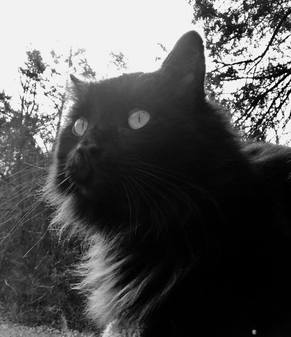 Day Two of Peak Week at Sacred Chickens! An Original Story by Roy Peak I walked into the kitchen and March, my older brother, was sweeping up a pile of salt from the floor. “Hope you threw some over your shoulder,” I told him. “Now why the hell would I do that? Then I'd just have to clean up two messes.” He tossed the broom into the corner by the door as he dumped the salt—dustpan and all—into the garbage can, leaving still quite a bit of salt on the floor. Guys. He sat down at the table and ate his eggs while staring into his cellphone. I picked the dustpan out of the can, grabbed the broom and swept up what he had missed. If he noticed what I was doing he didn't say anything. “I have plans today, so I can't give Uncle Ken a ride, can you take him?” he said between mouthfuls of runny eggs. Uncle Ken, wheelchair bound, had a job making phone calls for the Veterans Association. He used to drive himself in a custom equipped van but he wrecked it last summer. It still sat in his driveway, jacked up with the front wheels off, looking a bit like Uncle Ken did when leaning forward in his wheelchair to watch television. “I’m supposed to open up the store at ten,” I said, knowing full well that it wouldn't matter what I said. There was no way March was going to do something once he had made up his mind he didn't want to. “Cool. He has to be there by nine-thirty.” Still staring into his phone. What secrets did it possess? “Okay, fine. But you're picking him up.” “Whatever.” I left him to his eggs, snagged a soda from the fridge, and grabbed my keys from the hook by the back door. I had less than an hour to get to work which meant I had to hustle if I was going to pick up my uncle and drop him off first. No eggs for me, runny or otherwise. I opened the back door to leave. This was when all hell broke loose. As soon as I opened the door two birds flew in, chasing each other like crazy into the kitchen, knocking over March’s glass of orange juice in the process. I screamed,” March What the hell”! and the birds squawked loudly at one another while careening into the cabinets, flopped onto the counter and kicked over the carton of eggs, which March had left sitting out. March threw his plate at one of them—missed of course—and then grabbed the broom, flailing wildly and screaming like an idiot. “Stop! Stop, you're gonna break something!” I yelled as he almost hit me in the head with a backswing. “Damn straight! Gonna hit a mess of birds!” and he swung again, smacking the chalkboard clean off the wall. I yelled at him to stop but he swung wildly yet again, this time making contact. In an explosion of feathers, one of the birds fell to the floor, the other flew out through the still open door. March struck the one on the floor once again with the broom as it lay dazed. “Dammit, stop!” I jumped in, barring him from getting any closer to the bird and doing any more damage. “It's not dead yet,” he said, raising the broom over his head, hitting the ceiling light, causing it to sway back and forth, throwing shadows everywhere. I threw a dish towel over the bird and then scooped it up in my hands. March put the broom down and looked at the bird from over my shoulder. “That’s a starling,” he said matter of factly. “So you’re a bird expert now?” He shrugged his shoulders and walked out of the room. “I know things.” The poor bird was most definitely dead. I wrapped it up, towel and all, in a plastic grocery bag. I didn't have time to bury it so I tied up the bag tight and gently laid it inside one of the garbage cans. “Sorry, bird,” I said and headed to Uncle Ken’s, leaving March to clean up the kitchen. Yeah, right. Luckily Uncle Ken’s wasn't far, it was already quarter after nine by the time I pulled up to his apartment and Uncle Ken was sitting in his wheelchair right outside the door. “Hey, Majik,” he said. “I knew you wouldn't let me down. I love your brother but he's about as useless as tits on a boar hog.” “Agreed. Ready to go?” He wheeled himself towards the car. “Run in and grab my shoes. They're on the table.” He didn't need my help so I went inside to get his shoes while he maneuvered himself into the car. No shoes on the coffee table, none on the card table by the couch—ah, there they are, on the kitchen table, upside down and soles up, right next to Uncle Ken’s half finished breakfast of runny eggs and orange juice, carton of eggs still on the countertop, fry pan on the stove. He and March had that in common at least. I put the eggs in the fridge and by the time I got back outside, Uncle Ken was sitting in the car. I grabbed his wheelchair and wrestled it into the trunk of the Impala I had inherited from my dad when he passed away a few years back. It still ran like a champ even though the body was rusting away. “When you gonna fix up this old thing? Your dad would never allow this car to fall apart like this. A damn shame is what it is.” “Well it's not dad’s car anymore, it's mine. Besides I can't afford to fix it up with what I make.” I backed into the street and then floored it, tires a squealing. “And it still does that. So there.” “Whoo hoo!” yelled Uncle Ken as we were both pressed back into our seats from the acceleration. That ended that discussion. After driving Uncle Ken to work and helping him get his shoes on, I was nearly twenty minutes late to work. Finders Keepers was the only thrift store in town and I was its newest manager, which meant I was the one who had to unlock the doors in the morning and lock it up at six every night, Monday through Saturday. Luckily there was only one person standing out front waiting for it to open: Mrs. McDonald, the local nutty old lady. It was Tuesday so our 50% off sale wasn’t until tomorrow. On those days there’s a line to get in a half hour before we even open. “Sorry I’m late,” I said while unlocking the door. “No problem, honey,” she smiled at me. “My husband’s taking a nap. I’m just here to get him a pillow.” Okay… I thought to myself. Mrs. McDonald had been shopping here for years, much longer than I had been employed here. She was always nice, yet kind of nutty. As she shuffled off towards the bedding and linens section I checked the register to see how much cash was left from the afternoon shift the day before. Not nearly enough ones so I unlocked the office and got some out of the safe. Mrs. McDonald was still looking through the pillows and muttering to herself so I made a quick jaunt around the aisles, picking up abandoned items and putting them back where they belonged. I carried an armful of stuffed animals back to their bins on the back wall when my cell phone—sitting up front by the cash register where I had left it—rang. I dropped the critters on the floor--Sorry guys!--and ran to the front. Uncle Ken’s face filled the screen on my phone as I picked it up. “Hello?” “Hey, Majik! It’s me, Uncle Ken!” “Yeeeaaahhh... I noticed. Everything okay?” “Yeah, look, they said they don’t need me this afternoon, so can you pick me up around noon-thirty?” Mrs. McDonald was suddenly standing in front of me at the register, a large green pillow in her hands. There was a picture of a smiling mermaid on it with the same toothy smile Mrs. McDonald had. Both of them smiled back at me from across the counter like a pair of demented Stepford wives. I turned my back to them while I finished up with Uncle Ken. “Umm… as long as Dina shows up on time, yeah. Have you tried calling March?” “I did, honey. He said he had plans. Sorry.” I could tell he was genuinely sorry. Uncle Ken was like that—never fake, always up front with you. “No problem. I’ll call if Dina doesn’t show up.” “Thanks! I owe you one!” I hung up and smiled back at Mrs. McDonald. “Just the one pillow?” “Oh, one’s all I need, dear.” “Okay. That’s two dollars and thirteen cents.” “The sign says they’re a dollar.” She smiled even bigger, bright eyed and beaming. “Um, the smaller ones are a dollar. That size is a dollar ninety-nine.” She just stood there, clutching the pillow in both hands, her smile getting somehow larger with the second. “It’s for my husband.” A pause where she continued to stare at me and smile. Had she blinked even once yet? “He’s taking a nap.” Her smile was now encircling her head like the rings of Saturn. “Okay, one dollar plus tax, then.” Like I was going to argue with her over a dollar for a crap green pillow with a demented mermaid on it. “He hasn’t been sleeping well because the woman next door mows her lawn at night.” “Uh huh…” She reached Into her purse, pulled out a single dollar bill, laid it on the counter and then walked right out the door. Told you she was nutty. “All righty then. Thanks.” I figured that with the way my day was going that Dina wouldn’t show up at all but she surprised me by arriving right on time. Dina was older than me but you’d never know it from the way she acted. She used to play in a band years ago and still partied hard every night regardless of the fact that she had a six year old daughter to take care of. I left her at the thrift store while I ran to pick up Uncle Ken. He was waiting outside the place when I pulled up and ten minutes later we were halfway to his house. “Cops up ahead,” Uncle Ken said. Even though Uncle Ken used to be an officer, cops still freaked me out. A bunch of patrol cars were lining the road, even a news crew. “Six of ‘em. Damn. Pull over, let me see if I know any of these guys, find out what’s going on.” “Hey, Stafford!” he shouted to a tall cop leaning against his car, typing into his cellphone. “What the hell? Big sale on donuts or something?” I turned white as the cop’s head snapped to attention, staring daggers in our direction. He started walking over to us, hand on his gun, but eased up and then smiled when he recognized my uncle. “Haven’t seen you in ages. How’s it hanging, man?” They shook hands through the passenger side window. “Not bad. What’s the deal here?” The officer turned and pointed at the house. “Woman who lives here called in that her husband died in his sleep. When the paramedics got here they found her clutching a pillow and talking to herself, and put two and two together.” “Oh my god! Was it a green pillow with a mermaid on it?” I yelled before I could stop myself. “Yes. Yes it was. How did you know that?” Officer Stafford looked at me quizzically, leaning down into Uncle Ken’s window to see me better. “Um, she just bought it from my store. Mrs. McDonald, right?” “Yes ma’am. Wait right here. I may have to get a statement from you.” He walked toward the sergeant, pointing back at us as he talked to him. “She only paid a dollar for that pillow,” I said to Uncle Ken when he turned to look at me. “What a deal,” he said. I couldn’t help but laugh. I got out of the car to give my statement and I saw Mrs. McDonald in the back of one of the patrol cars. She waved at me with handcuffed hands hollering through the window, “Miss! Miss! I love my pillow! Thank you!” She still had that lobotomized smile thing going on. I tried ignoring her but she wouldn’t give up, getting louder every minute until Officer Stafford had to go over and tap hard on the window to get her attention. She shut up but kept right on smiling. I didn’t get back home until after seven. March was in the kitchen again, staring into his cellphone while shoveling food into his face. This time it was canned chili he had heated up in the microwave and of course he hadn’t covered it up and of course it had made a mess, splattering all over the inside of the microwave. “Wha’d you do today?” I asked him while wiping out the microwave. “Nuttin’.” “Thought you had plans?” “I did,” he said with a mouthful of chili, staring at his phone. “My plans were to not leave the house under any circumstances whatsoever.” I stopped cleaning the microwave, rolled my eyes, and noticed the trash was full. “I’m taking this out, then you and I are going to have a serious talk.” “What—“ he swallowed a big spoonful of chili, “—ever.” I knew that rolling my eyes again wouldn’t help but I did it anyway and then carried out the trash. Lifting the top off the can I was nearly knocked over by the bird I had placed in the can earlier—the one I was sure that March had killed—which flew out, squawking mad. I was too shocked to scream, and after a few seconds of it noisily screeching in circles around my head and trying to tie my hair into knots it flew over to the old oak tree in the backyard and finally quieted down. I brushed myself off as it sat on a branch, eyeing me suspiciously. “Guess I can’t blame you for being mad. I had a rough day, too.” 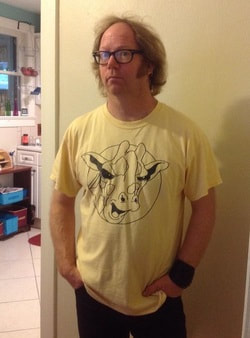 Roy Peak has played electric bass in more bands than he cares to remember for more years than he can remember. He wrote the theme song for the Utica, New York radio show "Hey You Kids, Get Off My Lawn" on WPNR-FM. His solo debut album, All Is Well, has been called "Loud, cacophonous, and beautiful by a truly unique artist." His short fiction has been published in The Dead Mule School of Southern Literature and he writes music reviews for the King Tut Vintage Album Museum of Jacksonville. Roy writes music reviews for the Rocking Magpie among others. 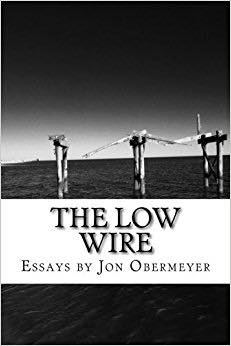 DAY ONE OF PEAK WEEK AT SACRED CHICKENS! Frequent Contributor Roy Peak has a lot to offer this week starting with a review of THE LOW WIRE by John Obermeyer. The Low Wire: Meditations on Loss and Creative Restoration Jon Obermeyer Fugitive Poets Press 2016 The Low Wire: Meditations on Loss and Creative Restoration by Jon Obermeyer is a hundred words that are part memoir, part self help book, part treatise on depression recovery. You’d think that a read such as this, which tends to jump around nearly as much as Kurt Vonnegut’s Slaughterhouse Five, would feel disjointed or meandering but that’s not at all the case. Obermeyer threads the needle of these assorted essays like an expert seamstress, sewing it all up into a perfect fitting garment. Simply told, slipping easily into poetic verse, then back into parable, even a smattering of a blues song, then into a series of earth shattering memoirs: The horrifying details and aftermath of a stroke at 57, the loss of a business due to the domino effect of the tragedy of 9/11, divorce, multiple evictions, staying with friends and family when he had nowhere else to go. Yet, Obermeyer’s tales of woe—serious as they are—lightly spring off the page in a manner that’s near impossible to put down. Seriously, I devoured these pages in one short evening, taking a break from Shelby Foote’s The Civil War: A Narrative, thinking I would simply be reading the first few pages to get a feel for it, but instead being engulfed completely in Obermeyer’s world. At times it feels as personal as peeking into someone’s diary entries, but there’s no scandal, no closets to be cleaned, just a terrific insight into another person’s thought processes, their hopes, fears, and dreams. Next up, I’m looking forward to tackling some of Obermeyer’s works of short fiction as he’s already gotten me hooked into these glimpses of his world and way of thinking. 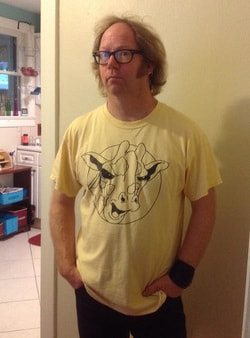 Roy Peak has played electric bass in more bands than he cares to remember for more years than he can remember. He wrote the theme song for the Utica, New York radio show "Hey You Kids, Get Off My Lawn" on WPNR-FM. His solo debut album, All Is Well, has been called "Loud, cacophonous, and beautiful by a truly unique artist." His short fiction has been published in The Dead Mule School of Southern Literature and he writes music reviews for the King Tut Vintage Album Museum of Jacksonville. Roy writes music reviews for the Rocking Magpie among others.  This profound poetry collection offers not only a mixture of personal reflection and societal commentary, but it also reads as a memoir. The author examines and dissects significant moments from his life, and through this we live his experiences, know his emotions and passions, as well as his torment. By the end, you almost come to know the author on a personal level. I at least learned a great deal about him and, no doubt myself, through the pages. In that way, it shows that some experiences are universal, no matter who they happen to. I also feel that the author didn’t make the mistake of aggrandizing his work, which is something that I find in a lot of poetry, where the passion is obscured and hidden behind rhymes, structure and flippant language. This is not that. Mostly, the emotion is raw, intense, and irreverent. You will find no fluff here. One of the pieces that I want to discuss is called, “Splinter Under the Fingernail,” which is one of my favorites from the first section. It is essentially the author’s commentary on the degradation of news and politics, which is something that is extremely relevant right now. For me, this piece is spot on in describing what has been happening in the last six months, pointing out how distracted the public has been while, “Those perverts in D.C are gang-raping the Bill of Rights.” And of course, it’s true, sadly; the public has been distracted and apathetic for too long. You hear it all the time when someone says, “I just don’t care about politics,” and it was proven when an average of forty percent of people didn’t vote. Even the news, our supposed source of information, is also distracted, he says. You can feel the frustration and the absolute disillusionment with the government in his writing that is now permeating the majority of the American public when he writes, “Can you smell the filth?” In the last couple of lines, he warns of a proverbial avalanche coming, and that people may wake up too late before it gets here. “Quit making the talentless rich with your terrible taste.” While I think that this poem can be interpreted in many ways, for me, it summed up the disgust, revulsion, and embarrassment that has become part of everyone’s daily lives since January. I, like many people, can smell the filth. And as much as I try to escape it, it oozes through every crack available and gets stronger by the day. At one time or another, most people have used the excuse of car trouble to justify being late. In this poem titled with that common explanation, the author exposes his heartache over a recent breakup. It is a raw and unfiltered glimpse at someone who has had their heart broken. It almost feels like you’re intruding on a private moment when you read this, because it’s so intimate and personal. The author is so deeply affected by this that he cannot even bring himself to pass a café where his ex-girlfriend used to work, which makes him fifteen minutes late for work every day. There is a sense of bitterness laced throughout the poem, especially in the last stanzas, when he talks of her feet. When you’re in love with someone, you love every part of them, even their feet. However, when you fall out of love, sometimes you hate everything about them, “Those, ugly, calloused feet.” Sometimes I found this collection funny, and that was definitely the case with, “Beehive.” It details the authors friend, Zach, who wants to be a professional photographer, but who loathes them and their moustaches at the same time. He’s intently taking pictures of a beehive, which he thinks will rival their pictures of tulips. Of course, he gets too close and steps on the hive, and he quite suddenly has a swarm of bees chasing him half-naked into traffic, which is the most hilarious thing that I’ve heard for some tim. I suppose that there is a broader message there, pride cometh before the fall and all that, but honestly, I love this poem because it made me laugh, and it somehow makes me hope that one of my friends happens upon a beehive one day. Overall, I found that the author’s voice was well defined and relatable. I liked that his approach to poetry was somewhat unique, using a more raw, stream of consciousness approach rather than a carefully structured format. The author's unique style couples with his intensely emotional self-reflection and spot-on social commentary, mark this book as one that has something for everyone. Any reader, young or old, can enjoy this book for what it is: an example of good writing. 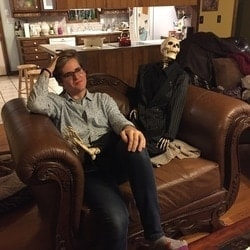 Jarad attends Middle Tennessee State University, loves tea, and tries to spend every spare second reading. Jarad is majoring in English. Bless his heart! Let's all light a candle for him and send him happy thoughts! |

Click Photo above to buy ebook or paperback from Amazon.
Here's the link to Barnes and Noble Or order through your favorite independent bookstore! Categories
All
|
 RSS Feed
RSS Feed